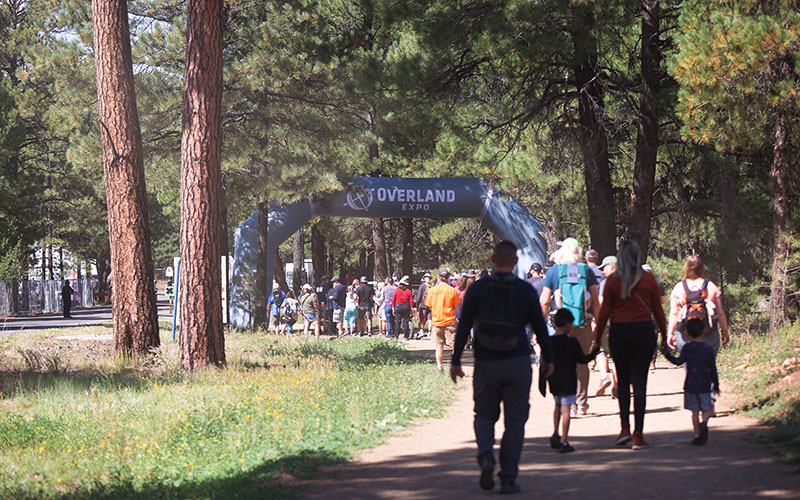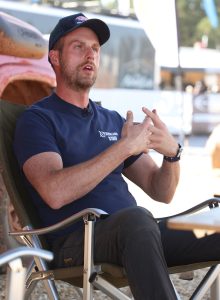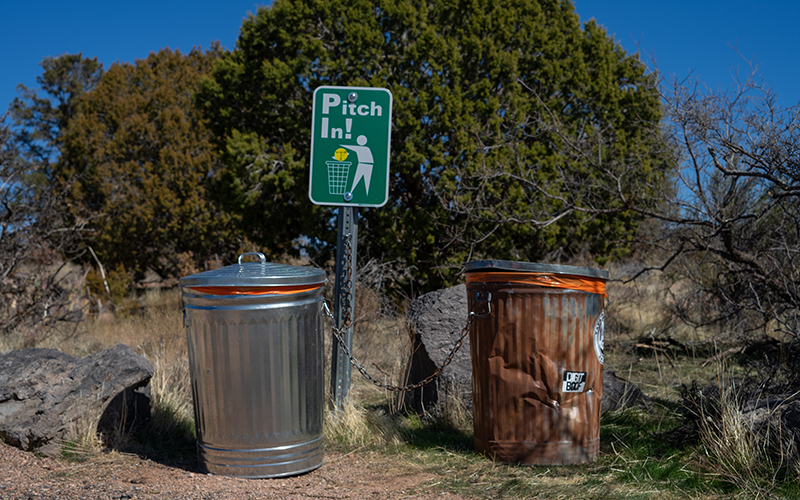FLAGSTAFF – Reagan Evans’ passion for overlanding and nature conservation is rooted in fond childhood experiences of outdoor adventures with his family.
Overlanding is a form of self-sufficient, off-grid adventure seeking that commonly uses large SUVs and pickup trucks to travel to remote locations using established roads and trails, store outdoor equipment and camp, often for extended periods. To most overlanders, the journey is the goal.
Evans, 46, an Overland Expo Foundation scholarship recipient and full-time traveler from Texas, said overlanders take to natural habitats to explore new sights or get away from civilization.
“I would take vehicles and go explore places that got a little bit further away from the crowds, whether it was a national park or state park, just getting a little further down the road or off the road was really appealing,” Evans said. “And then as the means of travel changed, motorcycles gave even more freedom, where all we needed was a goat trail to follow and we found some amazing vistas.”

The annual Overland Expo West, held Sept. 24 in Flagstaff, features overlanding demonstrations and training, as well as outdoor products from exhibitors. (Photo by Ella Ho Ching/Cronkite News)
With climate change and the dependency overlanders have on the Earth to explore new lands, community members have been advocating for natural conservation and cultural respect, as well as cleaner alternatives in the automotive industry, which was part of the focus of last month’s Overland Expo West in Flagstaff.
Nick Jaynes, director of communications for the Overland Expo Foundation, said fuel efficiency in overlanding vehicles is a real concern.

Nick Jaynes, director of communications for the Overland Expo Foundation, says the group is pushing automakers to produce electric vehicles suitable for overlanding. (Photo by Ella Ho Ching/Cronkite News)
“The Overland Expo Foundation is working with automakers to really push their electric vehicles into the overlanding space,” Jaynes said. “We’re working to embrace zero-emissions travel as fast as we can.”
Manufacturers and after-market companies have been catering to the demands of overlanding but environmental impact hasn’t been a primary focus area.
The Overland Expo Foundation is a nonprofit organization that was founded in 2020 to promote freedom of overland travel and fund individuals and organizations working to protect public lands.
More than 100 million pounds of waste are generated per year in national parks, according to Leave No Trace, which seeks to educate people on conservation.
Evans said it’s important to “tread as lightly as possible” when it comes to evaluating the impact of where and how overlanders are traveling. This would include keeping clean camping habits along with contributing to the local economy of the areas travelers are staying.
The Overland Expo Foundation awarded Evans a scholarship that will allow him to travel the Montes Azules Biosphere Reserve in southern Mexico to promote a necessary balance between outdoor tourism and sustainable practices. He’s scheduled to leave in December.
“The biosphere reserve is just a really amazing part of the country with amazing flora and fauna,” he said. “But because it’s not well known, there’s not a lot of tourism impact on the economy, and so the fear is that a place that’s really magical ends up not staying that way because it’s not well-cared for.
“My goal is to try to help the local community understand ways that they can welcome tourism and tourism dollars to help offset logging, animal trade or other things that are going to be detrimental in the long term.”
Along with Reagan’s mission, the Overland Expo Foundation plans to support other individuals and groups that strive to thrust the overland community into a more mindful and sustainable future.
“We want to protect the environment, we want to maintain the freedom of overland travelers, and at the same time, be respectful of all cultures and environments,” Jaynes said.
Overland Expo East opens Oct. 8 in Arlington, Virginia, where vehicle manufacturers, including Harley Davidson and Toyota, and exhibitors will showcase some new sustainable alternatives.


